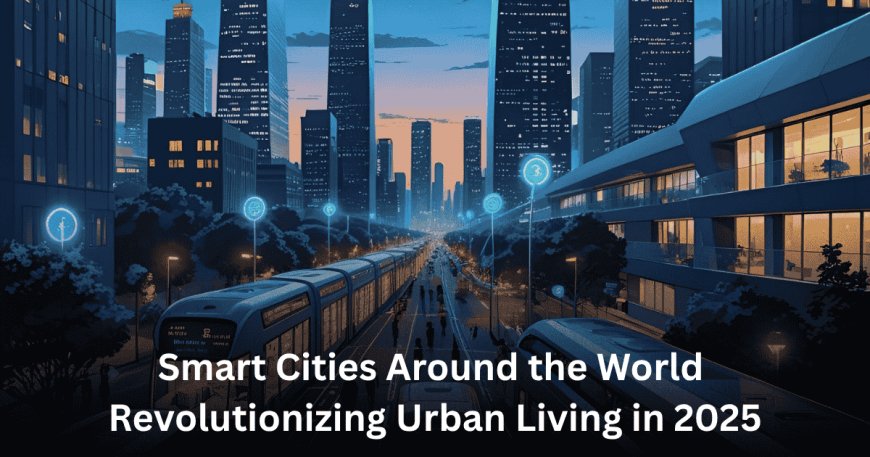Smart Cities Around the World: Revolutionizing Urban Living in 2025
Smart Cities Around the World Revolutionizing Urban Living in 2025

🌐 Introduction: A New Urban Era Begins
By 2025, smart cities will no longer be futuristic concepts they’re thriving realities reshaping how millions live, work, and interact with their urban environment. Leveraging cutting-edge technologies like AI, IoT, big data, and sustainable energy systems, cities around the globe are evolving to be more efficient, livable, and resilient. This article explores how smart cities in 2025 are delivering on promises of cleaner streets, smarter transport, inclusive governance, and improved quality of life.
🏙️ Defining a Smart City in 2025
A smart city in 2025 blends physical infrastructure with digital intelligence to optimize resources, ensure sustainability, and enhance citizen well-being.
Key characteristics:
- Integrated IoT systems for real-time monitoring of traffic, pollution, utilities, and public services.
- AI-powered governance is improving decision-making and policy implementation.
- Digital inclusivity ensures access to connectivity, e-services, and participation in civic processes.
- Green infrastructure like solar grids, electric public vehicles, and urban farming.
🌍 Global Leaders in Smart Urban Transformation
1. Singapore: The Blueprint of Urban Intelligence
Singapore stands as a beacon of smart city innovation. With its Smart Nation initiative, the city-state uses sensors and cameras to monitor everything from traffic to water usage. In 2025:
- Autonomous buses are operational across most districts.
- Predictive analytics helps manage energy consumption during peak hours.
- Seniors use wearable tech integrated into healthcare services for real-time monitoring.
2. Barcelona: A Model of Smart Sustainability
Barcelona has transformed its urban footprint with sustainable tech.
- Its smart lighting system reduces energy use by 30%.
- Urban farms and solar-powered public spaces are common sights.
- The city’s open-data portal allows citizens to track initiatives and contribute ideas.
3. Dubai: AI at the Heart of Governance
Dubai’s 2025 smart city is an ambitious merger of luxury and tech.
- AI-driven police drones ensure public safety.
- Blockchain facilitates transparent transactions across government services.
- Smart buildings adapt to external climate conditions to reduce energy footprints.
4. Amsterdam: The Citizen-Centric Smart City
With deep emphasis on inclusivity and sustainability, Amsterdam’s smart city focuses on:
- Circular economy practices reduce waste in real estate development.
- Bike-friendly roads mapped with sensors to improve mobility.
- Public data dashboards to increase transparency and accountability.
🚀 Technological Pillars Powering Smart Cities
1. Internet of Things (IoT)
IoT devices collect data across transport, healthcare, energy, and environment systems.
- Smart sensors help reduce water leakage and energy wastage.
- Waste management trucks use GPS and fill-level detectors for optimized routes.
2. Artificial Intelligence and Machine Learning
AI in smart cities handles predictive maintenance, automates transport, and analyzes citizen feedback.
- Cities use ML algorithms to anticipate traffic congestion and adjust signals.
- AI bots respond to civic queries and complaints with impressive accuracy.
3. Big Data Analytics
From weather patterns to transit flows, big data helps urban planners and administrators make proactive decisions.
- Real-time dashboards for emergency response teams reduce reaction times.
- Analysis of usage patterns leads to dynamic pricing for electricity and water.
4. 5G Connectivity
Seamless communication is central to smart city ecosystems.
- 5G enables instant updates to autonomous transport systems.
- High-speed internet supports widespread digital learning and telemedicine.
🌱 Sustainability and Eco-Conscious Living
2025 smart cities are designed to balance technological progress with environmental preservation.
Green innovations include:
- Smart grids use AI to distribute renewable energy efficiently.
- Eco-friendly transport like e-bikes, shared electric shuttles, and hyperloop experiments.
- Green buildings with vertical gardens and self-regulating temperatures.
Cities like Copenhagen and Helsinki are showing how climate-smart tech and policy can go hand-in-hand to reach net-zero goals without sacrificing citizen comfort.
👥 Citizen Engagement and Governance in Smart Cities
Smart cities aren't just about infrastructure; they're about people.
Enhancing civic participation:
- Digital platforms allow residents to vote on local issues and offer feedback on city policies.
- AI bots streamline bureaucratic processes like permits, licenses, and tax filings.
- Virtual town halls and community dashboards create space for inclusive dialogue.
In Seoul, South Korea, residents can track the carbon footprint of neighborhoods and collaborate in community-led sustainability challenges.
🚗 Mobility and Transportation Innovations
Getting from point A to B in 2025 is smoother, faster, and cleaner.
Transportation features:
- Autonomous public vehicles operating on fixed and demand-based routes.
- Multi-modal mobility hubs integrating bikes, metros, and e-scooters.
- AI traffic prediction is helping reduce congestion and accidents.
Stockholm’s MaaS (Mobility as a Service) platform allows users to plan, book, and pay for diverse transport options with a single app interface.
🏢 Smart Housing and Urban Living
Housing in smart cities adapts to the behavior and needs of residents.
What’s new in 2025:
- Smart homes with voice assistants controlling lights, climate, and security.
- Shared living spaces equipped with co-working pods and rooftop gardens.
- Blockchain-backed tenancy systems offering transparent rental agreements.
Tokyo's smart apartments use biometric access, AI predictive maintenance, and mobile-enabled building controls for ultra-personalized urban living.
📉 Challenges and Ethical Concerns
No transformation comes without hurdles.
Key concerns in 2025:
- Privacy and surveillance: Citizens worry about how data is collected and used.
- Digital divide: Ensuring all socio-economic groups have access to smart services.
- Cybersecurity threats: As dependency on tech grows, so does vulnerability to breaches.
To mitigate these, cities are investing in cyber-resilience frameworks and inclusive tech policies with citizen oversight.
🧭 The Road Ahead: What to Expect Beyond 2025
As smart cities evolve, expect:
- Greater emphasis on mental wellness via digitally enhanced urban spaces.
- Biophilic design merges nature and tech for healthier environments.
- AI counselors and robotic helpers in elderly care centers.
Ultimately, smart cities of 2025 prioritize experience over infrastructure, creating a harmonious blend of innovation, sustainability, and humanity.










































